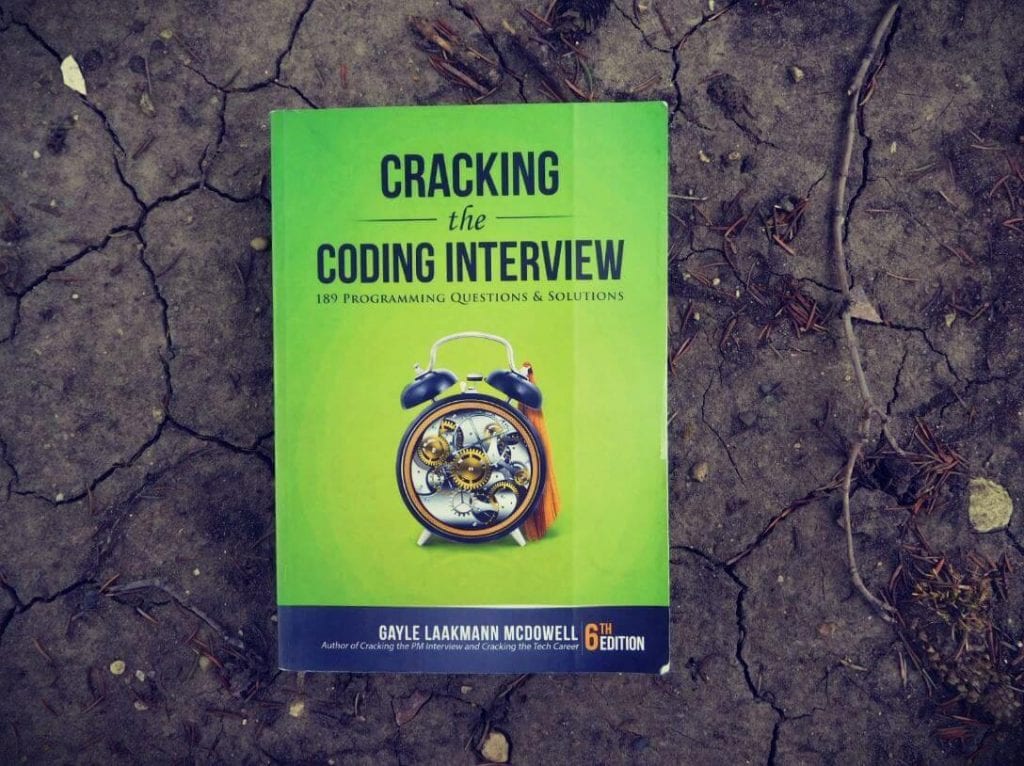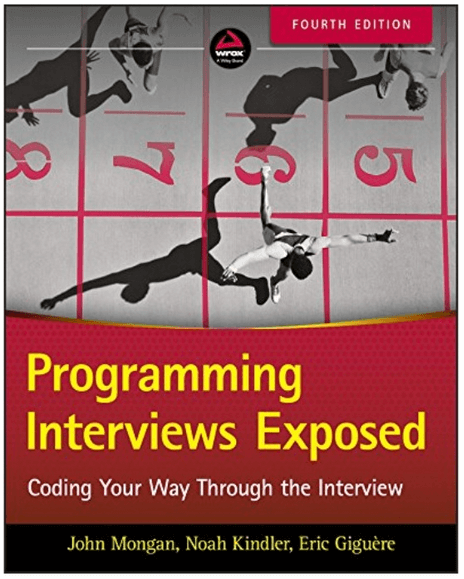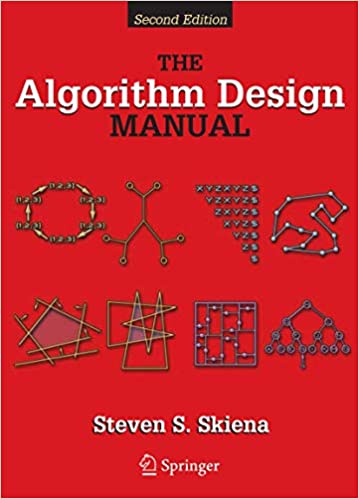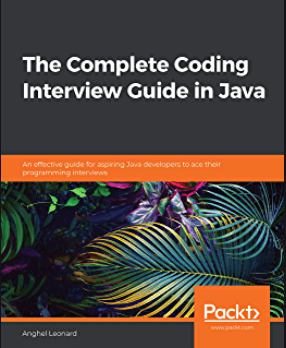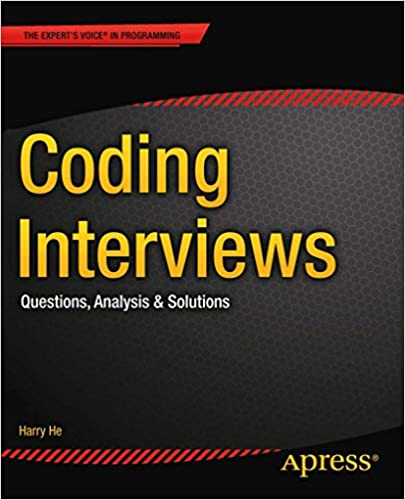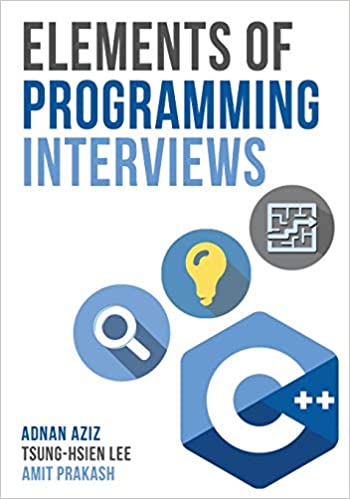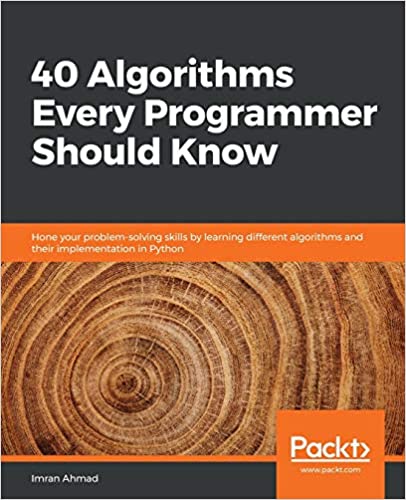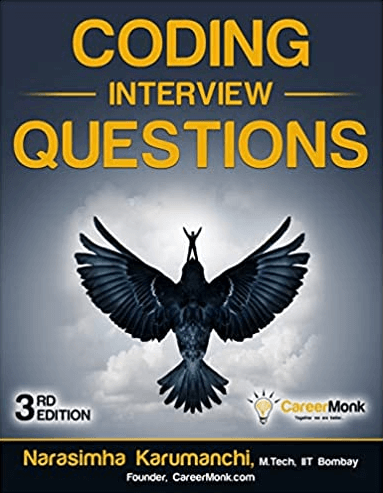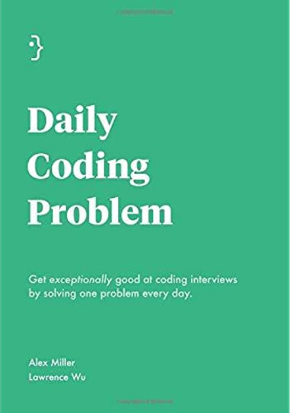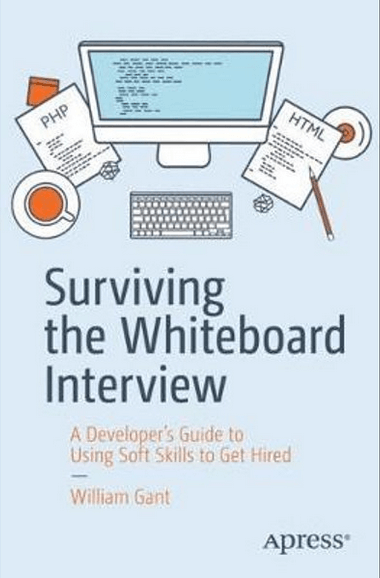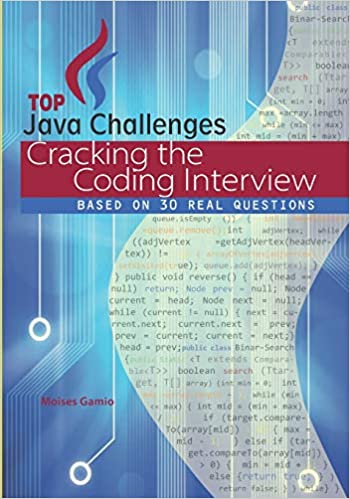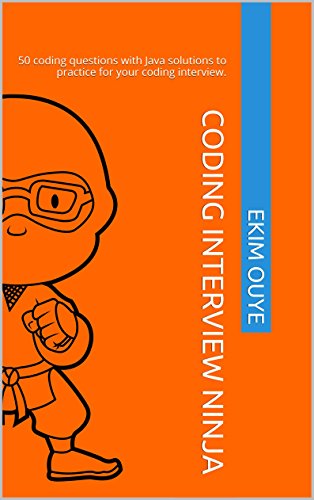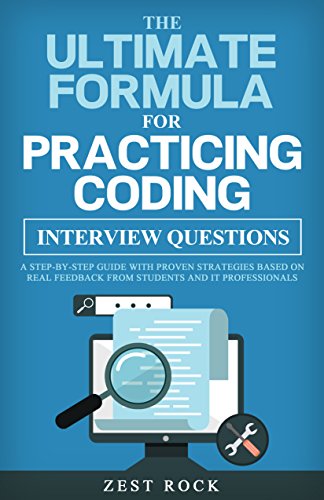Finding the best technical interview books is important now more than ever.
Why?
Well, did you know that only .2% of Google applicants get hired?
Sure, over 3 million people apply annually, but that’s still a relatively small acceptance rate.
So you need the right tools to put you in a higher preparedness bracket.
To put you ahead of the pack.
Basically, you need to blast the competition out of the water.
This post contains affiliate links. I may receive compensation if you buy something. Read my disclosure for more details.
TLDR: 13 Best Technical Interview Books This Year
Out of the 13 best technical interview books of this year, we chose the 3 best based on the following criteria:
🔥 Best Overall 🔥
Cracking the Coding Interview
💥 Best for Newbies 💥
40 Algorithms Every Programmer Should Know
💸 Best Value 💸
Programming Interviews Exposed
Technical Interview Books
Read on to see which technical interview books can help you prepare for the technical interview.
1. Cracking the Coding Interview
Cracking the Coding Interview is on its 6th edition which now contains 189 programming questions.
It was created by former FAANG software engineer and interviewer Gayle Laakman McDowell.
The first part of the book focuses on things like:
- preparing for the interview
- the interview process
- behavioral questions
And big-O notation.
The second part of the book contains 189 programming questions asked at actual technical interviews.
Included are solutions and solution walkthroughs.
In addition, there are ample hints similar to the ones you would receive at a technical interview.
Also included are 5 strategies to take on algorithm questions which will enable you to solve most problems. Even if you’ve never seen them before.
Most of the solutions are presented in Java.
Read our full review of Cracking the Coding Interview.
Want to double up with a course? Sign up for Data Structures for Coding Interviews in Java on Educative.io.
2. Programming Interviews Exposed
Programming Interviews Exposed by John Mongan, Noah Kindler, et al. goes beyond standard technical interview books.
In addition to a collection of problems and answers, you’ll learn the process of coming up with solutions.
This book tackles traditional technical interview problems like data structures and algorithms.
Also, it covers more modern topics like:
- probability
- data science
- statistics
- machine learning
And beyond.
In addition, you’ll learn how to speak to the interviewer to keep the interview in your favor.
You’ll also learn how to navigate phone screens by recruiters.
Most importantly, Programming Interviews Exposed will teach you how to demonstrate your abilities under pressure.
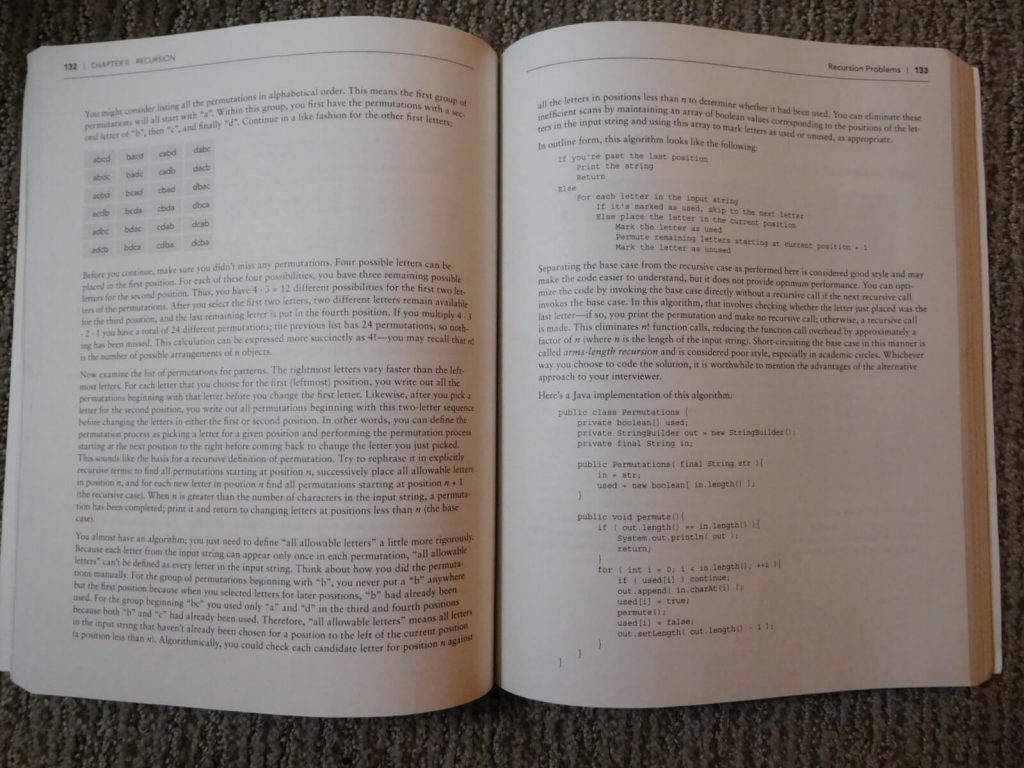
Looking for more programming interview questions? Sign up for the course Grokking the Coding Interview: Patterns for Coding Questions on Educative.io.
3. The Algorithm Design Manual
The Algorithm Design Manual by Steven Skiena is a technical interview prep book separated into two parts.
The first half of the book provides methods for designing computer algorithms.
The second half is comprised of a catalog of resources for algorithms and implementations.
This latest edition includes coverage of randomized algorithms, quantum computing and more.
With over 100 problems, there are full illustrations and code to clarify concepts.
Also, there’s a section of problems asked at actual technical interviews.
You’ll also learn about the 75 most common algorithmic problems that interviewers are asking.
Note: Code solutions are written in C.
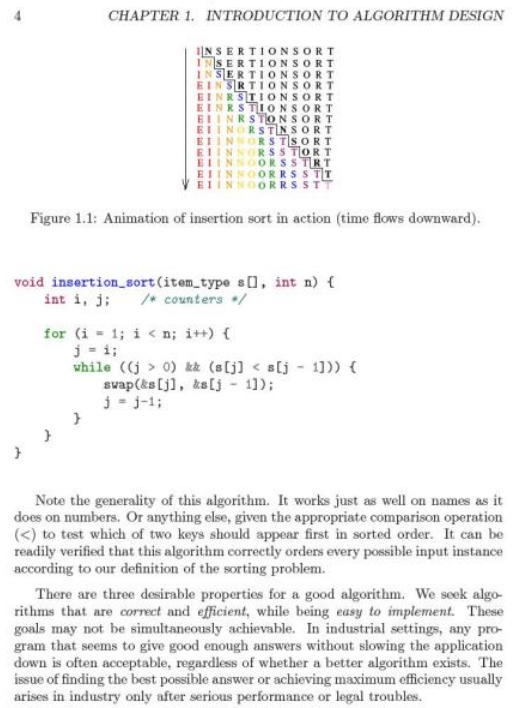
🔥 Geena’s Hot Take
This book is a heavy load.
But there’s a reason it’s regarded as one of the best technical interview books by hundreds of developers.
The Algorithm Design Manual teaches you how to think about algorithms.
In addition, author Steven Skiena often presents his own stories within the text to make the content more relatable.
4. The Complete Coding Interview Guide in Java
The Complete Coding Interview Guide in Java by Anghel Leonard has over 200 technical interview questions and solutions written in Java.
Each solution is delivered in a step-by-step manner to help you understand the process of solving coding problems.
The first part of the book will walk you through some non-technical interview questions.
Then you’ll work on the 200+ coding problems and their solutions with walkthroughs.
By solving these problems, you’ll develop skills in data structures and algorithms:
- arrays
- strings
- maps
- linked lists
And beyond.
Also, you’ll learn about more difficult concepts like concurrency, functional programming, and system scalability.
5. Coding Interviews: Questions, Analysis & Solutions
Coding Interviews by Harry He contains coding interview questions asked at actual software companies.
First you’ll learn the basics of programming languages, data structures and algorithms.
Next, you’ll learn how to write high-quality code. Also, you’ll get tips on solving difficult technical problems.
Then you’ll learn different methods to optimize code.
Finally, Coding Interviews covers the soft skills you need to ace the technical interview.
Aside from coding solutions, there’s also detailed analysis of each problem.
In addition, you’ll learn how interviewers evaluate your solutions.
By the end of this book, you should be able to write more robust code in less time.
6. Elements of Programming Interviews: The Insiders’ Guide
Elements of Programming Interviews by Adnan Aziz, Tsung-Hsien Lee, et al. contains over 150 technical interview questions with detailed solutions.
Contained within the problems are over 200 illustrations.
In addition, there are 300 tested programs and 150 variants.
This comprehensive book opens up with non-technical interview elements such as:
- interview strategies
- common mistakes
- interviewer perspectives
- negotiation
Also provided is a summary of data structures, algorithms and problem solving patterns.
Coding problems are separated by:
- basic and advanced data structures
- searching
- sorting
- algorithm design principles
- concurrency
Each chapter contains an introduction, case study, tips and library methods.
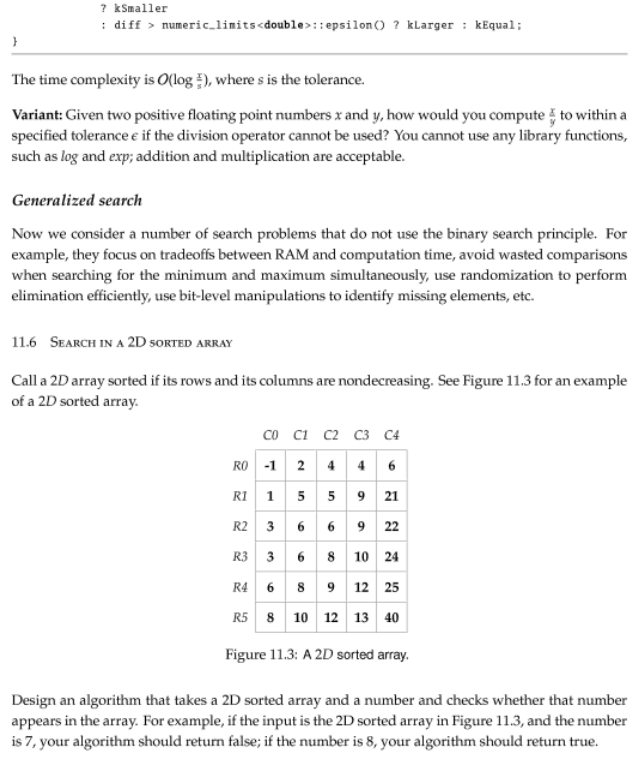
C++ not your thing? Be sure to check out Elements of Programming Interviews in Python and Elements of Programming Interviews in Java.
7. 40 Algorithms Every Programmer Should Know
40 Algorithms Every Programmer Should Know by Imran Ahmand contains algorithms you can expect to be asked at technical interviews.
First you’ll learn the techniques you need to know to be able to design algorithms that solve complex problems.
Also, you’ll learn about neural networks and deep learning techniques.
You’ll learn how to choose the correct data structures to pair with algorithms for the most efficient implementation.
In addition to exploring existing data structures and algorithms in Python libraries, you’ll:
- implement graph algorithms
- work with machine learning algorithms
- use supervised learning algorithms
- detect objects
- use symmetric and asymmetric encryption on the Google Cloud Platform (GCP)
And more.
Solutions are given in the Python programming language.
8. Coding Interview Questions
Coding Interview Questions by Narasimha Karumanchi is meant to teach the basics to beginners.
First you’ll learn about design interview questions.
Also, you’ll cover questions based on data structures and algorithms.
Detailed explanations accompany every problem. The interview questions in this book are asked at actual technical interviews.
These coding interview questions are basic.
For more advanced technical interview questions, you may want to consider Cracking the Coding Interview.
9. Daily Coding Problem
Daily Coding Problem by Alex Miller and Lawrence Wu contains questions that are asked at actual interviews.
The idea is that by practicing one coding problem a day, you’ll be prepared for the technical interview.
Each question has an in-depth solution to make sure you understand the concepts.
Some of the technical questions you’ll work on include:
- linked lists
- arrays
- graphs
- trees
- stacks and queues
- dynamic programming
- randomized algorithms
- system design
And much more.
Problems range from beginner to advanced.
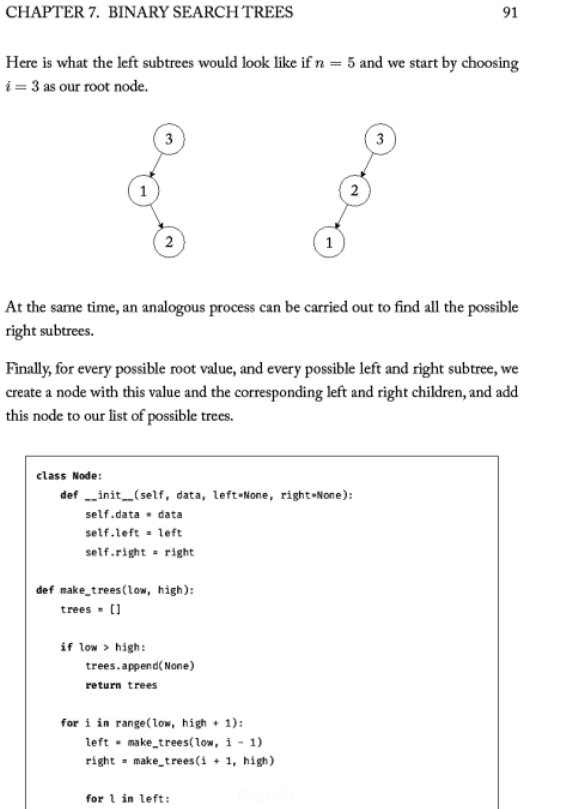
10. Surviving the Whiteboard Interview
Surviving the Whiteboard Interview by William Gant is one of the more unconventional technical interview books we’re looking at today.
Whiteboard interviews can be one of the most difficult technical interviews because you’re:
- on the spot
- solving problems
- speaking publicly
- being judged by strangers
Instead of looking at technical problems, the book examines how soft skills and technical skills work together to get you hired.
So you’ll learn about soft skills you’ll use during the technical interview.
In addition, you’ll learn how to solve whiteboard problems in different programming languages.
Surviving the Whiteboard Interview is ideal both for beginners and experienced developers who need to build up their soft skills so they can survive the technical interview.
Want to work more on your soft skills? Sign up for the course Grokking the Behavioral Interview on Educative.io.
11. Top Java Challenges
Top Java Challenges by Moises Gamio was created by a software engineer who has worked for startups and larger tech companies.
The book contains a collection of questions asked at actual technical interviews.
Contained in these pages are 30 problems such as FizzBuzz, bubble sort and binary search tree.
You’ll learn how to understand the basics of data structures and algorithms. Then you’ll apply them to various problems.
Also, you’ll use the test-driven development approach to develop a complete algorithm. So you’ll be able to design an algorithm to solve problems you haven’t seen before.
12. Coding Interview Ninja
Coding Interview Ninja by Ekim Ouye contains 50 coding questions with solutions in Java.
Each of these questions is designed to be solved in a 45-minute window… A time typically expected in a technical interview.
Before practicing technical interview questions in this book, you’ll need to brush up on:
- Java
- running time complexity
- data structures
- algorithms
- recursion
- object-oriented design
And more.
13. The Ultimate Formula For Practicing Coding Interview Questions
The Ultimate Formula for Practicing Coding Interview Questions by Zest Rock is a little different than other technical interview books on our list.
Instead of practicing coding questions, it will show you how to practice coding interview questions.
This includes:
- what questions to practice
- how to organize pseudocode on a whiteboard
- how much time you should spend solving a problem
- performing mock interviews
And much more.
The Ultimate Formula covers everything from goal-setting to establishing the right mindset. And how to prepare all the way up to the coding interview.
Technical Interview Books: Conclusion
Today we looked at some of the best technical interview books for this year.
But we narrowed it down even more:
Best Overall
Cracking the Coding Interview
Best for Newbies
40 Algorithms Every Programmer Should Know
Best Value
Programming Interviews Exposed
So regardless of what you’re looking for, we think there’s something for every programmer.
Up Next:
- 9 Best Data Science Courses for Beginners [+4 Data Science Learning Paths]
- 8 Best Web Design Courses [And Web Design Learning Paths]
- 21 Best Web Design Books [Learn Web Design]
- 14 Best UX Books [Beginner to Advanced UX Designers]
What are the best technical interview books?
While we found 13 technical interview books, three of them stood out among the rest. For best value, we think Programming Interviews Exposed takes the cake. For newbies, we enjoyed 40 Algorithms Every Programmer Should Know. And for best overall, we chose Cracking the Coding Interview.
Is Coding Interview Questions a good book for beginners?
Yes, we think Coding Interview Questions is a good book for beginners. It is meant to teach the basics to beginners. First you’ll learn about design interview questions. Also, you’ll cover questions based on data structures and algorithms. These interview questions are asked at actual technical interviews. Detailed explanations accompany every problem.
Is Programming Interviews Exposed a good book?
Yes, we think Programming Interviews Exposed is a good book. It goes beyond standard technical interview books. In addition to a collections of problems and answers, you’ll learn the process of coming up with solutions. This book tackles traditional technical interview problems like data structures and algorithms. Also, it covers more modern topics like probability, data science and statistics.
![13 best technical interview books this year [technical interview prep]](https://realtoughcandy.com/wp-content/uploads/2021/02/cover-best-technical-interview-books-1024x576.jpg)
